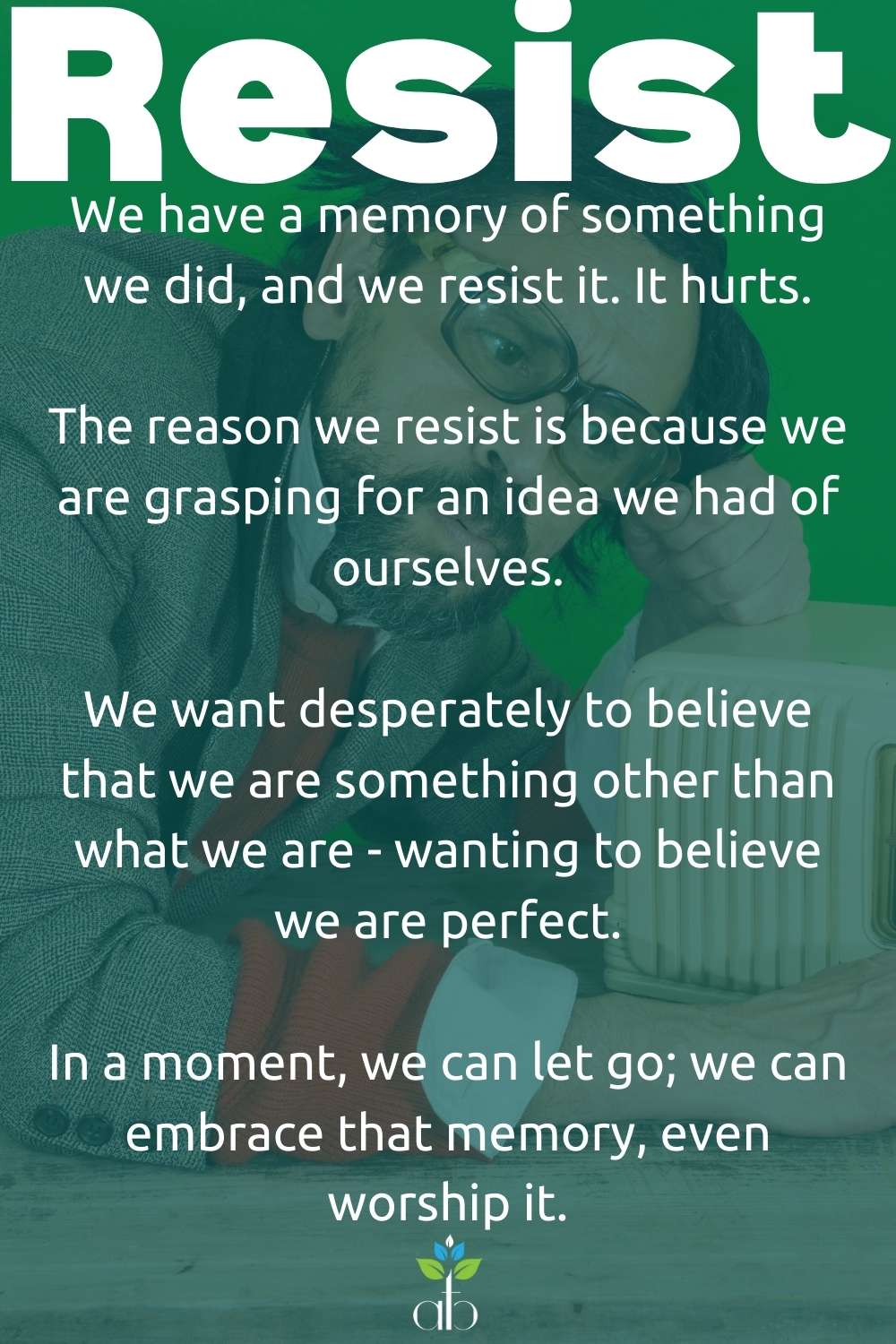Episode 478
Grasping And Resistance

Often a memory will come to mind, and we get a glimpse of something we did. In that moment we might sense an incongruence.
We grasp for a sense of self, an idea that we had about who we were. That leads us to resist what actually happened. The inevitable result is suffering.
In fact, grasping and resisting are so closely related that we might say they are the same thing. To grasp for something we wish were true is to resist the reality.
In a single moment, we can let go of grasping, let go of resisting, allowing, embracing or even worshipping what we once were, and what we now are.
Hosts & Guests
Kurt Robinson
Transcript
Welcome, beautiful thinkers!
I’d like to talk to you about grasping and resisting.
So at the end of the day, this video popped up on my phone.
It was a video of the great teacher, Ram Dass.
And he was talking about grasping, he was saying that a lot of the time, in fact, probably every single time when we are suffering, it is because we’re clinging to something trying to hold on to something, which probably no longer exists in the form that we had it or that we imagined it to be.
Now that thing is gone, and we’re here trying to hold on to it.
And of course, we’re just holding on to the idea of it, even though we know very well that it iss incongruent with actual reality.
So, of course, that causes a suffering.
Is this dissonance between reality, and how we imagined things to be, and how we desire things to be, that causes us suffering.
I was thinking about this.
And I started to realize, “Ah, this is so obvious, but I never thought of this before.”
Clinging and resisting, or grasping and resisting, they’re actually two sides of the same coin, they’re actually so closely related as to be actually the same thing.
So when we are trying to hold on to something, we’re resisting the reality of the situation.
I’ve talked before about the various reasons that we have these cringy moments.
When we think about memories, moments, we did something that appears to us as embarrassing.
Realistically, probably nobody else sees it as shameful.
“It’s very, very rare that people go out of their way to think about us in a way, that is disrespectful like that, like they don’t they don’t spend their time thinking, “That guy’s such a dork.”
It’s very rare for people to do that, because they have their own things to worry about their own cringy memories.
But these moments appear to us as embarrassing.
And we’re there cringing about them.
Part of the reason.
In fact, the principal reason is that it defies our identity.
So we had this conception of ourselves.
And we still have this conception of ourselves.
We want to believe that we weren’t the kind of person who would do something like that, who would make that faux pas, or trip up in that way, do that clumsy thing.
We desperately want to believe that.
But why?
We want to believe that we’re infallible.
That can never be true.
It’s not a realistic idea of ourselves.
Yet here we are grasping, trying to hold on desperately to that idea of ourselves, that we are the perfect person that we are so cool.
That we’re fonzie.
That we never made a mistake.
And we never feel fear.
And we never do anything embarrassing.
Which is not us.
No, we’re something different.
We are this raw, real portrait of a person who can mess up.
Who can say things that are a bit different.
And these things are are all part of the raw and gritty picture of a person that you are.
That is realistic, that is a realistic idea of of oneself.
Beautiful and raw and expressive and real.
That’s, that’s what we are.
But we try to hold on to these ideas that can never be so.
At the same time, we are resisting the reality of the situation.
We might even go into denial about it, pretend to ourselves that we didn’t do those things that we very well know that we did.
Fine, I was saying to my buddy the other day, you know, sometimes people misrepresent the truth to us.
But the main reason normally is not to deceive us.
The main reason that people tell untruths is to deceive themselves, because they desperately want something to be true.
And so they stain it as if it’s true, hoping with this unconscious impression that somehow this is going to affect reality.
Well, not like that.
We can affect reality we can change things, but not that way.
Not without resistance, not with that grasping or that denial.
No.
I have found that one Ram Dass teaches us is true.
When we can let go of that grasping.
Not always the easiest thing to do.
But we can do it.
When I’ve been doing lately, when these memories emerge.
I worship them.
I adore, I practice adoration.
On that person that I once was.
The person who is now transformed and worshipped the memory itself.
Sam Harris says, “When we have that memory or that uncomfortable thought, and an uncomfortable feeling, we can welcome it.
Just as if it were a possession, which we’d assumed lost.”
Now here it is for us again.
Ready to be received.
Welcome to our insecurities to our uncomfortabilities, to our problems, to adverse emotions and to our wonderful emotions.
To all of them actually seeing correctly.
Now they are all wonderful.
Now they are all messages.
Now they are all worthy of gratitude.
Now, the person that you once were is imperfectly perfect and perfectly imperfect.
Now just as you had to be.
Just as you’re always going to be.
Now you were, now you are.
Now.
Now we let go of grasping and resistance. truly embrace the world and ourselves.
Now we are.
Now we are.

New Episodes Every Weekday
11am Mexico City time
10 min episodes Monday - Thursday
1 h interview episode on Fridays
As an Amazon Associate I earn from qualifying purchases.
Stay Beautiful &
Stay Connected
